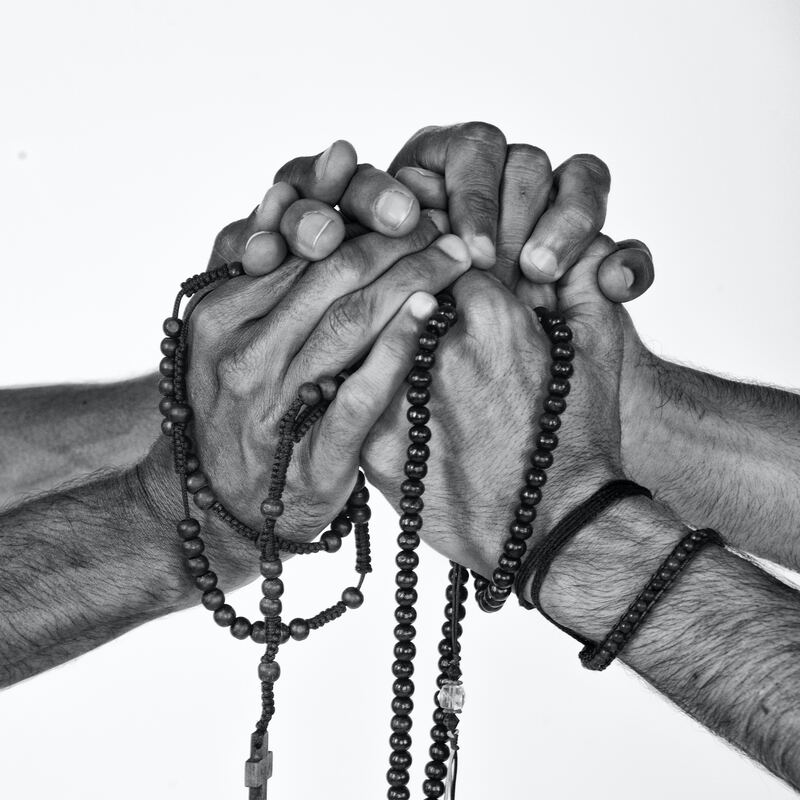|
PROGRAMING OUR MINDS: An exploration of the traits of religious trauma.
Some bodies are born “gay” in that they have genetic anomalies that create distinct hormone signatures and therefore expressions. Other bodies have environmental pressures that shift gene expression in such a way that adaptive behaviors display as “traits”. The nature/nurture argument is ongoing and can be applied in a sociological exploration of religion as well. The region of America known as the “South” has traits that some view as Christian religious values. From my perspective, these traits are more in alignment with Cluster B personality disorders. That is to say, the fundamental belief that “Non-believers will burn in the pit of hell” is narcissistic at best. The celebration of human sacrifice, wearing a crucifix as jewelry, and claiming admonishment from sin through the blood of Jesus is something that seems more like occult practices than it does a base for morality. Admittedly, as a student of psychology, philosophy, and biology, I can see the use for aspects of religion that are healthy, such as having an in-group or “tribe” to belong to. However, I also hold a strong bias that is more consistent with Freud's assertions on religion: In "The Future of an Illusion" (1927), Freud wrote: "Our knowledge of the historical worth of certain religious doctrines increases our respect for them, but does not invalidate our proposal that they should cease to be put forward as the reasons for the precepts of civilization. On the contrary! Those historical residues have helped us to view religious teachings, as it were, as neurotic relics, and we may now argue that the time has probably come, as it does in an analytic treatment, for replacing the effects of repression by the results of the rational operation of the intellect."4 The challenge is that, as philosopher Sam Harris asserted, “Many who claim to have been transformed by Christ’s love are deeply, even murderously, intolerant of criticism” ( https://www.samharris.org/blog/reply-to-a-christian; 1/16/24). On its face, we can see the irony of such behavior. Nonetheless, it’s unacceptable to me as a practitioner that helps people acknowledge, understand, and somatically process trauma while maintaining a structurally safe environment in session that can be applied in each of my client’s lives. In other words, I provide a space where the abuses experienced from religious leaders can be spoken about without reservation. To me, this seems like a rational evolution of being a Relationship Coach in the South. I feel a responsibility to invite people to explore how their self-esteem has been impacted through their exposure to religious dogmas. Further, I would be remiss to remain in denial about the harm “Faith Based” therapeutic practitioners can inflict should they blindly align with the beliefs listed below: Baptist Christianity encompasses a range of beliefs, and there may be variations among different Baptist denominations. However, here are some core beliefs that are often associated with Baptist Christianity: 1. Authority of Scripture: Baptists generally believe in the authority of the Bible as the inspired and infallible Word of God. They look to the Scriptures for guidance in matters of faith and practice. 2. Salvation by Faith Alone: Baptists typically emphasize salvation through faith in Jesus Christ alone, rather than through good works. This aligns with the Protestant doctrine of justification by faith. 3. Believer's Baptism: One distinctive feature of Baptists is their belief in believer's baptism, which means that individuals are baptized only after making a personal profession of faith in Jesus Christ. 4. Autonomy of the Local Church: Baptists often uphold the autonomy of the local church, meaning that each individual congregation is self-governing and makes decisions independently. 5. Priesthood of All Believers: Baptists affirm the priesthood of all believers, emphasizing that each Christian has direct access to God and can interpret the Scriptures under the guidance of the Holy Spirit. 6. Separation of Church and State: Many Baptists advocate for the separation of church and state, believing that the church should not be controlled or influenced by governmental authorities. 7. Congregational Polity: Baptist churches typically operate under a congregational polity, where the congregation has a significant role in decision-making processes. 8. Evangelism and Missions: Baptists often prioritize evangelism and missions, seeking to spread the message of the Gospel and make disciples of all nations. The programming of our minds is the inheritance of each child from their parents and from their society. Many of us have been indoctrinated into obscure cult-like structures that are given a shiny veneer. When we get our worldview reinforced instead of challenged, the practice of rhetoric and critical thinking gets traded for unquestioned allegiance. It’s my assertion, harm can come from with working with a “Faith based” mental health practitioner who can reinforce cult-like belief systems, Cults are often characterized by certain traits that distinguish them from mainstream religious or social groups. It's important to note that the term "cult" can be subjective, and not all groups exhibiting these traits are necessarily harmful. However, some common traits associated with cults include: 1. Authoritarian Leadership: Cults typically have a charismatic and authoritarian leader who holds significant power and influence over the members. The leader's decisions are often unquestioned, and dissent is discouraged. *For instance a loud pastor that yells his sermons, spits with fervor, and evokes emotional escalation in his congregation. 2. Isolation and Control: Cults may isolate their members from the outside world, limiting their contact with friends, family, or information that contradicts the group's beliefs. This isolation can make it challenging for members to critically evaluate the group's teachings. 3. Manipulation and Deception: Cults often use manipulative tactics, such as mind control, emotional manipulation, or deception, to influence and control their members. This can involve distorting information, making false promises, or creating a sense of dependency on the group. 4. Exclusive Beliefs: Cults tend to have exclusive and often extreme beliefs that set them apart from mainstream society. These beliefs may involve apocalyptic visions, a special mission, or a claim to possess unique spiritual insights. 5. Exploitation: Cults may exploit their members financially, emotionally, or physically. This can include pressuring members to donate large sums of money, engaging in forced labor, or subjecting them to physical or psychological harm. *chatgpt 1/16/24. It doesn’t take much to draw a comparison between the evangelical practices and cult traits. Moreover, we can, with rational application of thought, draw a parallel between cult leaders dispositions and cluster B personality traits as listed below: Antisocial Personality Disorder (ASPD):
Lastly, the South has one of the richest resources for energy production–coal–and the poorest population of people. Is it possible, generational poverty, exploitation that rivals civil atrocities, introduction of opiates, and ripping apart families in the name of “protecting children '' have created a sub-culture of people who are easy prey for controlling religious leaders who are purporting hope? Might we be able to assert faith without bigotry? Can we repair the divide through empowering each person to embrace their autonomy and responsibility to be good stewards of their bodies? I certainly hope so! To engage in conversation with me on this topic please email: [email protected] or use my calendar to book a session.
0 Comments
THE COST OF LEADERSHIP
So many people talk about “Reaching the summit”. We have esteemed being “at the top” as the ideal position to exist in. This is bull-shit for so many reasons. People die summiting in the same way businesses fail within the first 3 years. We aren’t prepared to climb. We don’t want to pay the cost but we spend our lives either jealous or envious of those who “made it”. Made what? I asked business owners about what was one of the annoying things they had to deal with? Two themes emerged. The first was a lack of respect that came from either the customer or from peers. The second was how many people “no-call; no show”, which is a waste of time. So what do these two things have in common? The perception of the business owner. We are so bombarded with options so much so that we assume each interaction is of little importance. Consumers are slaves to corporate algorithms so much so that we have forgotten what it’s like to have our local barber know our name, our barista actually care about our order, our doctor knows our children’s name, and what having relationships with the people who offer us their services is like. Further, to survive as a “Medium business owner; because there is nothing small about us” we are consumed by the digital instruments that are necessary for us to be successful. The talent that drew us to owning our business ends up taking a back seat to skill-sets we are learning on the fly. Our clients don’t understand this. Consumers are assholes. I’m a consumer. I’m an asshole. But, being a business owner has humbled me. I know that every person who checks me out at a cash register is trading their precious time for money. I know that most of America is “scraping to buy” and then gazing at the social media influencers as deities with blueprints to heaven. It’s sick and we are all paying the cost. The literal cost of business is massive in regards to sweat equity. Early stage entrepreneurs grapple with the ideas never quite sure who in the market is going to respond. Plus, we try and do everything ourselves meaning it takes 3x the time to create mediocre results. Mid-stage entrepreneurs have solidified their systems in a way that generates “break even” revenue. A lot of us try to pivot prematurely, which keeps us in the early stage so long that we run out of money or passion and quit. But, if this doesn’t happen and we can build momentum in the market, we can get to the growth stage of business. It stops being about us and what we want and the business informs us what it needs, we can respond with agility, and adapt to shifting markets. In the final stage, we sell off the business, for what many hope to be a hefty profit. Each stage comes with a cost. What is needed at every stage is a genuine relationship. We need customers that know us and that we know. We need to know our business and our brand identity. We have to form a healthy relationship with “debt” in regards to leveraging it. Two things are non-negotiable when advancing through theses stages:
That’s where I am going to end this blog article. The intention is to get you thinking about your next steps. There’s no formula homie. You are going to have to ask for help and knowing what to ask help for is the “magic sauce.” I’m here when you are ready to get spicy. REBEKAH FREEDOM 2024 SELECT THE BEST |
Learn What to do NextI'll do my best to write about real world issues that stress us out and provide solutions to manage life successfully. Archives
February 2024
Categories |


 RSS Feed
RSS Feed